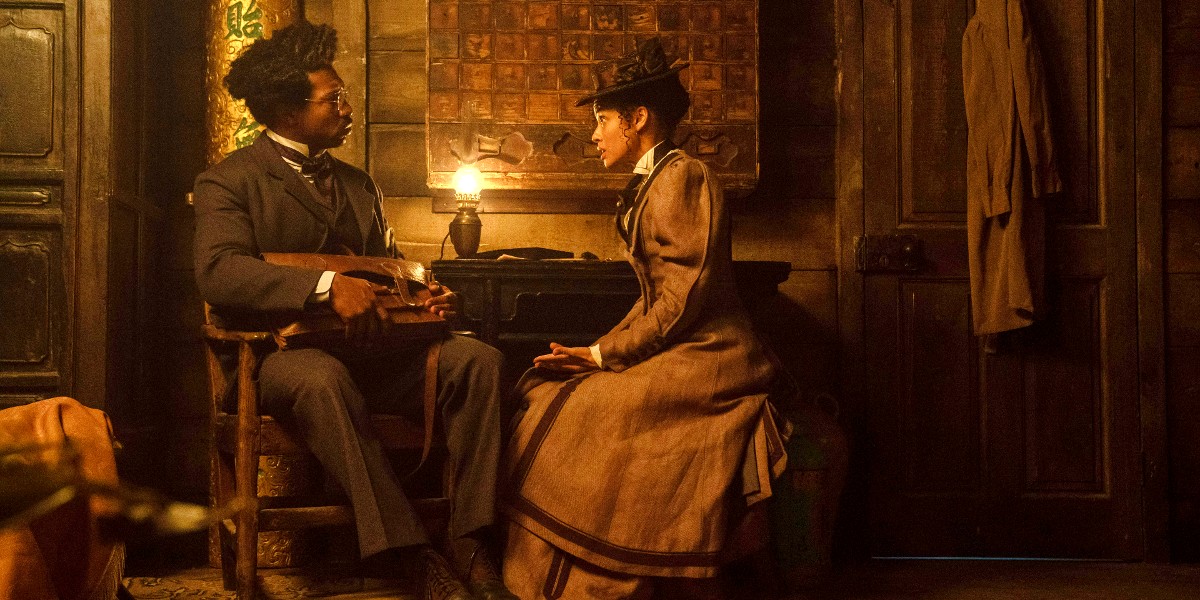The Real-Life Inventor That Helped Inspire ‘Loki’s Victor Timely

Loki season 2 recently introduced a new variant of Kang the Conqueror to the Marvel Cinematic Universe: Victor Timely (Jonathan Majors). While Timley has a Marvel comic book history, Loki also drew from real-life history for the character, finding inspiration in inventor Granville Woods.
In the comics, Timely is a version of Kang who travels to the year 1901, seeking to take over the 20th century. He settles down and establishes the small town of Timely, Wisconsin, where he becomes mayor. Under his leadership, Timely became a hotbed of technological advancement. In his free time, he also works on creating Chronopolis, a headquarters for all his variants. What’s interesting is that Timely wasn’t a variant but simply an alias and disguise that Kang used. So Loki shifts away a bit from the comics by seemingly making him a true variant.
For now, this variant seems harmless, and doesn’t appear to have knowledge of his other variants, though he did learn about the Time Variance Authority. Rather than Kang in disguise, Timely is a true inventor in Loki, causing a stir at the 1893 Chicago World Fair as the inventor with a proposal of an electrical power system to light the city. While everyone wants to patent his inventions, he prefers to work alone and has a knack for ripping off businessmen. Loki does an excellent job of differentiating him from He Who Remains, as well as from his comic book counterpart. It turns out the show did this with a bit of inspiration from Woods.
Loki director explains the inspiration for Victor Timely

In an interview with The Hollywood Reporter, Loki director Kasra Farahani discussed the show’s strategy for creating Timely. Given that viewers already know who Kang the Conqueror is, the show wanted to surprise them with something different.
In addition to writers’ room discussions on the characters, Majors did his own research and worked to help develop Timely. Farahani explained that many of their discussions centered around Woods, who ended up being an essential piece of Timely’s character. He stated:
Jonathan showed up with so much work and invention in terms of the Timely character, and some of the conversations that he and I had in the run-up to shooting were about a historical figure named Granville Woods. He was a Black inventor from the late 19th century, and he lived exactly when Timely would’ve lived, basically. He invented so many things, and people were constantly trying to steal them from him. Edison twice tried to take his patents, but [Edison] lost in court and ended up offering Woods a job, which was declined. So he was an important figure that went into Timely as well, but Jonathan built the mannerisms, the physicality, the quirkiness and the specific mix of how he represented intellectual brilliance with social awkwardness, a degree of charlatanism and pathos at the end.
The character of Timely is strikingly similar to Woods’ story. Though inventors like Thomas Edison often overshadow Woods, he is considered one of the greatest inventors of his time. Woods made history as one of the first African-American engineers following the Civil War. Unfortunately, he faced racist discrimination and prejudice during his career.
While Loki painted a rather comical picture of Timely being hassled over his inventions and patents, it isn’t too far from Woods’ truth. Other inventors were always trying to steal and claim credit for Woods’ work. Businessmen were constantly backtracking on promises of payment, and he had every right to be wary of offers to buy his patents. He was even sued by Edison twice, who tried to steal Woods’ most notable invention, the Multiplex Railway Telegraph. Fortunately, Woods beat Edison in court and succeeded in protecting his inventions.
Timely’s lone-wolf attitude may also be a subtle connection to Woods. After being defeated in court, Edison offered Woods a job, but Woods turned it down. Woods never relied on partnerships or aid from others in his career. He was a self-taught inventor, rising from humble beginnings in Ohio to an engineer, mechanic, and inventor all on his own. His refusal to work with Edison may have been wariness or understandable resentment over the court cases but may have also been Woods’ way of showing that he was a capable and intelligent inventor who didn’t need a job from the famous Edison to prove himself.
Despite being a pioneer in the fields of engineering and invention, Woods’ story does not get told often enough. Even when it is told, he’s often dubbed the “Black Edison,” despite working so hard to establish a legacy apart from the inventor who tried to steal his work. Woods’ name and legacy should be known without evoking that of Edison. Hence, it’s fortunate that Loki is paying tribute to this inventor by imbuing some of his history into Timely and capturing the scope of his genius and the troubles he faced as an inventor in the late 1800s.
(Via THR, featured image: Disney+)
Have a tip we should know? [email protected]